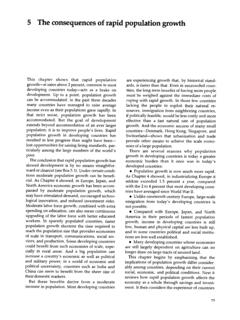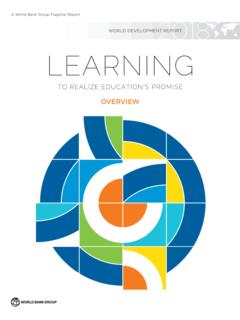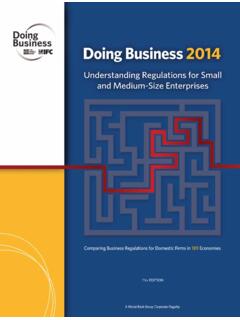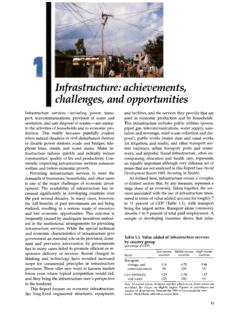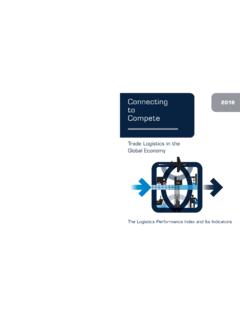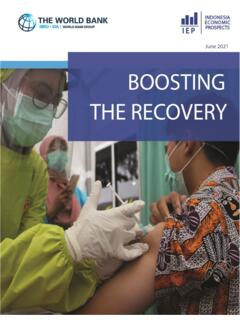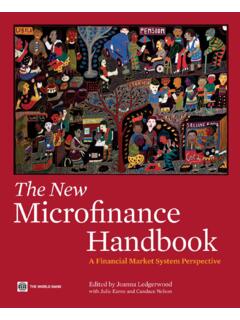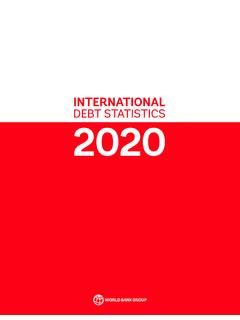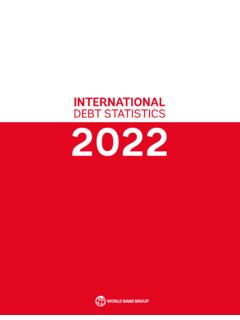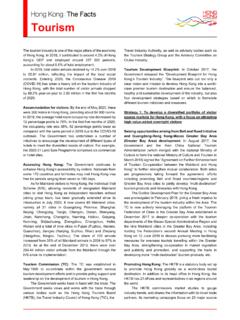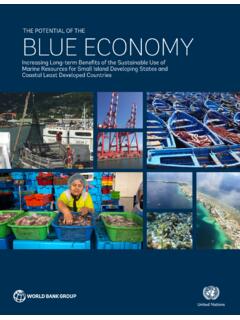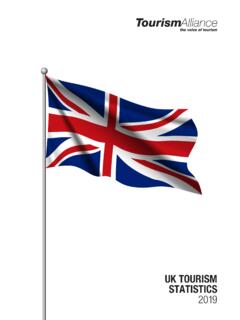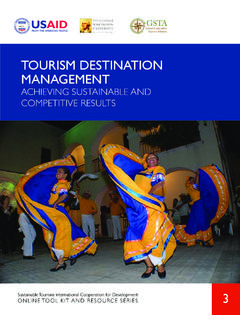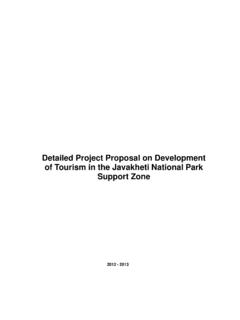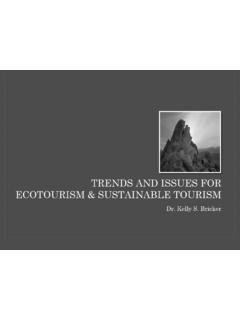Transcription of REBUILDING TOURISM COMPETITIVENESS - World Bank
1 REBUILDING TOURISM . COMPETITIVENESS . TOURISM response, recovery and resilience to the COVID-19 crisis Markets & Technology Global TOURISM Team | July 2020. MARKETS & TECHNOLOGY REBUILDING TOURISM COMPETITIVENESS 1. Acknowledgements This note was authored by the World Bank Group's Markets & Technology Global TOURISM Team including John Perrottet, Hannah Messerli, Louise Twining-Ward, Shaun Mann, Hermione Nevill, Jessie McComb and Andrew Beath under the guidance of Markets and Technology Practice Manager Martha Licetti, and Global Director for Trade, Investment and COMPETITIVENESS Caroline Freund. The team is grateful to technical reviewers who provided insight and guidance at various stages of the production of the note including Mariem Malouche, Kiran Afzal, Tanja Goodwin, Andres Garcia, and Zenaida Hermandez Uriz.
2 Valuable contributions were provided by Emiliano Duch, Wouter Schalken, Jose Miguel Villascusa Cerezo, Jan Kazimierz Orlowski, Ana Cristina Alonso Soria, Gemma Torras Vives, Dennis Sanchez Navarro and Jessica Wilson. The note responds to the COVID-19 crisis that hit the TOURISM sector in the first quarter of 2020. The crisis is ongoing, so any recommendations made in this report should be considered through the lens of developments that have taken place in the intervening period. 2 MARKETS & TECHNOLOGY REBUILDING TOURISM COMPETITIVENESS . Table of Contents 3 4. POLICY RESPONSES 24. The World Bank Group and Past Crises 27. EXECUTIVE SUMMARY 4. Thinking Forward in the Context 28.
3 1. GLOBAL CONTEXT AND CURRENT IMPACT 6 of Uncertainty Advice for World Bank Clients 29. 2. SECTOR IMPACTS AND Phase 1: Immediate Response (during 30. COUNTRY VULNERABILITIES 8 the crisis and early recovery). Sector Impacts 9 Phase 2 Recovery: Short-term 31. Aviation 10 Phase 3 Recovery: Medium-term 32. Accommodation and Lodging 12. 5. CLOSING CONSIDERATIONS 34. Tour Operators 12. Cruise Operators 13 Appendix 1: Global Aviation Data 35. Digital Platforms 14. Appendix 2: Regional and Country 38. Global Distribution Systems 14 Vulnerability Data of TOURISM : Economic Other Sectors and Impacts on Global Value Chains 14 Dependence and TOURISM Resilience Risk Score 3.
4 COUNTRY IMPACTS. Appendix 3: Menu of Response Options 39. AND VULNERABILITIES 16. TOURISM Dependence 17 Endnotes 44. TOURISM Resilience Risk 18. TOURISM Demand Impact on Recovery 20. MARKETS & TECHNOLOGY REBUILDING TOURISM COMPETITIVENESS 3. Executive Summary The travel and TOURISM industry was one of the first sectors to be affected by COVID-19. Since March, the entire value chain that defines the industry spanning airlines, bus and train companies, cruise lines, hotels, restaurants, attractions, travel agencies, tour operators, online travel entities, and others has entered a state of suspended animation. While bankruptcies of major airlines and large tour operators have been widely reported, the effects of the crisis are perhaps being most acutely felt by the Small and Medium-sized Enterprises (SMEs) that make up around 80 percent of licensed TOURISM and TOURISM -related businesses, and are at the greatest risk of failure.
5 Their potential collapse threatens to adversely affect millions of people across the World , including many vulnerable communities, who depend on TOURISM for their livelihoods. According to the World Travel & TOURISM Council, as many as 100 million jobs supported by travel and TOURISM are currently at risk. The COVID-19 pandemic will undoubtedly leave a deep imprint on the structure of the travel and TOURISM industry. Collapsing consumer demand, low cash reserves, and a lack of access to flexible lines of credit has forced many smaller travel and TOURISM operators to close. At the same time, while larger firms such as national airlines, tour operators, cruise lines and nationally branded hotel operators are better positioned to withstand the crisis, they are also facing significant challenges as demand is not recovering anytime soon.
6 While some agile players have repurposed their offering, the pandemic is likely to fuel consolidation and potentially vertical integration across the sector. While in the short-term there is a risk of widespread discounting to attract visitors to return, in the medium to long-term consolidation may spur price increases and reductions in the range and quality of services. Consequently, the travel and TOURISM sector that will emerge from the pandemic is likely to be smaller, in terms of both employment and revenue, than it was before. The process of consolidation and vertical integration is also likely to curtail opportunities provided by the sector for operators from developing countries .
7 4 MARKETS & TECHNOLOGY REBUILDING TOURISM COMPETITIVENESS . The broader economic impacts of the slump in travel and stakeholders should initially focus on supporting measures to TOURISM on individual countries and destinations will vary contain the virus and on helping viable businesses to withstand depending on their economic dependence on TOURISM and the crisis. Potential measures include carefully managing their resilience, as well as the dynamics of demand in their travel restrictions, providing tax rebates and fee waivers, key source markets. The global economic and pandemic and subsidizing training to forestall layoffs. Once the crisis uncertainty is therefore a key limiting factor for both source subsides, stakeholders should focus on building understanding markets and destinations.
8 countries that are highly dependent of prevailing consumer sentiment and in developing new on TOURISM include many small island countries , as well as products and modalities appropriate for the post-crisis lower and lower-middle income countries with many people context. For instance, stakeholders may implement periodic employed by travel and TOURISM . The resilience of destinations surveys to collect data from both providers and consumers, is conditioned by factors such as the local policy environment, expand the access of small-scale providers to digital platforms, public health policies, ICT readiness, government policies for and incentivize training and upskilling.
9 This is also a good time TOURISM , and the extent of tourist service infrastructure. In this to consider strategic public investments in product upgrades so respect, operators in many developing countries are likely to the destination is positioned for recovery when the time comes. be more vulnerable than operators in developed countries . As the demand for travel and TOURISM starts to grow again, Finally, countries with substantial domestic TOURISM markets stakeholders should develop policies and practices that enhance or which can form regional travel bubbles' are likely to the resilience, and economic and environmental sustainability experience quicker recoveries than those countries dependent of the sector, such as by enhancing the efficiency and equity of on inter-regional markets and particularly those dependent on regulation, investing in inclusive, eco-friendly and community- China, Europe and the based TOURISM models.
10 And leveraging technology to enhance regulatory compliance and expand access to market for In responding to the pandemic, governments have employed smaller operators. By taking measures to deepen the positive a range of instruments to support operators in the travel and impacts and minimize adverse consequences, destinations can TOURISM sector. While some governments have provided support help build back a better travel and TOURISM sector. to firms across the economy and the TOURISM sector in general, others have focused policy interventions on specific TOURISM As the effects of the pandemic unfold, the World Bank Group sub-sectors such as hospitality, food services, hotels, and continues to monitor and advise clients on how to respond airlines.
